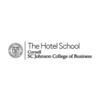Cornell Roundtable Joins Labor with Management
Discussion Focuses on Law’s Effects on Union Organizing
Ithaca, NY | The prospects for labor and management to establish a rational approach to union organizing drew representatives of both groups to the seventh annual Labor and Employment Roundtable, held in May 2008 at the Cornell University School of Hotel Administration. This is the first year that the roundtable has included participants with ties to organized labor. In addition to the session on labor organizing, the roundtable examined how employers can work with the Equal Employment Opportunity Commission (EEOC) and the pitfalls inherent in wage-hour laws.
The roundtable session on union organizing examined the newly minted "Ethical Code of Conduct in Union Organizing for Management and Labor.” Joining this roundtable session were Rick Hurd, a professor at the Cornell ILR School, and Richard Bensinger, the former organizing director of the AFL-CIO and the founder of the Organizing Institute. Developed by union and management representatives to remedy what both sides see as potential flaws in current practice, this code calls for a campaign by both labor and management, followed by an election in which employees decide whether to organize. Among its provisions, the code establishes new rules that require, among other things, access for union, no promises by the union, and honesty from both sides. (For a full description of the code see: .)
This discussion, which also featured Dean Stewart Schwab (Cornell Law School) and Dean Harry Katz (Cornell's ILR School), broke new ground as union and management representatives combined with leading academics to debate a "fair" way to deal with union organizing. The management lawyers were intrigued by the idea, but still saw potential pitfalls. Joe Baumgarten of Proskauer Rose, for instance, stated that he was leery of a system that did not include a dispute resolution mechanism.
Working with EEOC: Pain and Pleasure
In the second session, Gregg Gilman, of Davis and Gilbert, and David Sherwyn, professor at Cornell, presented their research on management’s responses to discrimination claims from the EEOC. They suggested a “bi-modal” distribution of reactions. When they are presented with a discrimination charge, corporate counsel will take the charge seriously if they believe the EEOC might initiate litigation on the claim. However, if management and counsel determine that EEOC is not inclined to litigate, the company often sends a perfunctory response to the claim, and then waits to see whether the EEOC would resolve the charge through mediation or whether the claimant retained a lawyer. In any case, participants expressed a common concern that EEOC litigation is on the rise in some areas.
Running Afoul of Wage-Hour Laws
Carolyn Richmond, of Fox Rothschild, and Paul Wagner, of Shea, Stokes, Roberts, and Wagner, led a discussion in which employers reported the horrors of compliance with wage-hour laws and how unintended violations of unclear technical points could turn into lawsuits that threatened a company's viability. As explained by Martha Lomanno, a 2008 graduate of the School of Hotel Administration, her preliminary state-by-state analysis of wage and hour laws demonstrates the complexities facing employers. The roundtable closed with a discussion of the vicissitudes of immigration law, led by Stephen Yale-Loehr of Miller Mayer, LLP. A chief problem identified by participants is the difficulty of getting visas for lawful workers and ensuring that all members of their work force are legally in this country.
About The Center for Hospitality Research
A unit of the Cornell School of Hotel Administration, The Center for Hospitality Research (CHR) sponsors research designed to improve practices in the hospitality industry. Under the lead of the center’s 71 corporate affiliates, experienced scholars work closely with business executives to discover new insights into strategic, managerial and operating practices. The center also publishes the award-winning hospitality journal, the Cornell Hospitality Quarterly (formerly the Cornell Hotel and Restaurant Administration Quarterly). To learn more about center and its projects, visit .
Center partners and sponsors: AIG Global Real Estate Investment, American Airlines Admirals Club, Davis & Gilbert LLP, Deloitte & Touche USA LLP, Denihan Hospitality Group, Expedia, Inc., Four Seasons Hotels and Resorts, Fox Rothschild LLP, General Growth Properties, Inc., HVS, InterContinental Hotels Group, job.travel, JohnsonDiversey, Inc., Jumeirah Group, LRP Publications, Marriott International, Inc., Marsh’s Hospitality Practice, Mobil Travel Guide, Inc., Nestlé, PricewaterhouseCoopers, Proskauer Rose LLP, Smith Travel Research, Southern Wine and Spirits of America, Inc., SynXis (a Sabre Holdings Corporation), Taj Hotels Resorts and Palaces, Thayer Lodging Group, TIG Global, Travelport, WATG, and WhiteSand Consulting.
Center friends: 4Hoteliers.com • American Tescor, LLC • Argyle Executive Forum • Caribbean Hotel and Restaurant Buyers Guide • Cody Kramer Imports • Cruise Industry News • DK Shifflet & Associates • ehotelier.com • EyeforTravel • Fireman's Fund Insurance Company • Gerencia de Hoteles & Restaurantes • Global Hospitality Resources • Hospitality Financial and Technology Professionals (HFTP) • hospitalityInside.com • hospitalitynet.org • Hotel Asia Pacific • Hotel China • HotelExecutive.com • Hotel Interactive • Hotel Resource • International CHRIE • International Hotel and Restaurant Association • International Hotel Conference • International Society of Hospitality Consultants (ISHC) • iPerceptions • KPMG Japan/Global Management Directions • Lodging Hospitality • Lodging Magazine • Milestone Internet Marketing • MindFolio • PKF Hospitality Research • The Resort Trades • RealShare Hotel Investment & Finance Summit • Resort+Recreation Magazine • RestaurantEdge.com • Shibata Publishing Co. • Synovate • The Lodging Conference • TravelCLICK • UniFocus • WageWatch, Inc. • WIWIH.COM
Jennifer Macera
Associate Director
(607) 255-3101
CHR
